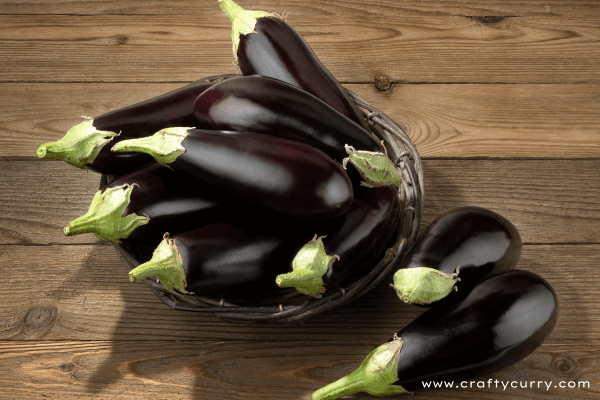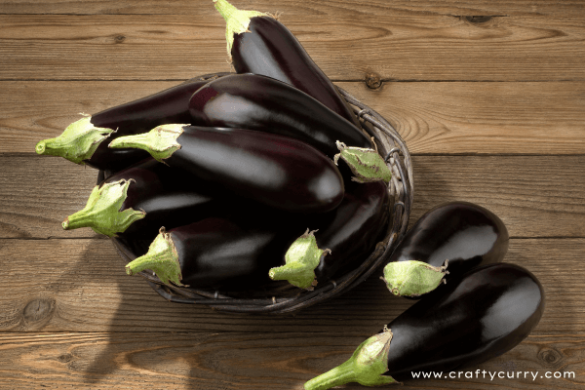
Did You Know? Eggplant, also known as brinjal, has been cultivated for over 4,000 years, originating in the Indian subcontinent. Though often overlooked in the vegetable aisle, eggplant is a powerhouse ingredient in cuisines around the world, loved for its ability to absorb flavors and transform into delicious, tender dishes. Today, let’s dive into the history, cultural significance, culinary uses, health benefits, and some interesting myths surrounding eggplant.
The History and Cultural Significance of Eggplant
Eggplant has a rich history that dates back to ancient times, particularly in India, where it is native. The fruit, often mistaken for a vegetable due to its savory flavor, was cultivated in India as early as 2000 BC. From there, it spread across the world, making its way to the Middle East, Africa, and eventually Europe.
In ancient times, eggplant was sometimes referred to as “the apple of love” due to its association with fertility in some cultures. It was considered a delicacy in the Middle East and Persian cuisines, while in China and Southeast Asia, eggplant has been a staple in countless dishes for centuries.
In modern-day cooking, eggplant holds significant value in Mediterranean, Asian, and Middle Eastern cuisines. Whether it’s the main ingredient in a rich Moussaka from Greece, a beloved addition to a Baba Ganoush dip, or cooked with spices in an Indian Baingan Bharta, eggplant’s versatility is unmatched.
Ingredient Deep Dive: Eggplant in the Kitchen
Eggplant is a wonderfully versatile vegetable that can be used in a variety of dishes, both savory and sweet. Its mild flavor allows it to absorb the spices and flavors of the dishes it’s cooked in, which is why it shines in so many cuisines worldwide.
- Grilled or Roasted Eggplant: One of the simplest and most popular ways to cook eggplant is by roasting or grilling it. The flesh becomes tender and smoky, and it can be drizzled with olive oil, garlic, and fresh herbs for a simple yet flavorful dish.
- Baingan Bharta (Indian): This classic Indian dish involves roasting eggplant until it’s charred, then mashing the flesh and cooking it with onions, tomatoes, and a blend of aromatic spices like cumin, turmeric, and coriander. It’s often served with naan or rice.
- Baba Ganoush (Middle Eastern): A smooth and creamy dip made by roasting eggplant and blending it with tahini, garlic, lemon juice, and olive oil. It’s a popular appetizer in Middle Eastern and Mediterranean cuisine.
- Moussaka (Greek): A layered casserole with eggplant, ground meat, and béchamel sauce, Moussaka is a filling and savory dish often served as a main course.
- Eggplant Parmesan (Italian): Sliced eggplant is breaded, fried, and layered with marinara sauce and cheese to make a delicious vegetarian version of the classic Italian dish, often baked until golden and bubbly.
- Stir-fries and Curries: Eggplant is often added to stir-fries and curries, absorbing the spices and becoming a tender, flavorful addition. Dishes like Thai Green Curry with Eggplant or Chinese-style stir-fried eggplant are widely enjoyed.
Health Benefits of Eggplant
Eggplant isn’t just tasty—it’s also packed with nutrients that offer a variety of health benefits.
- Rich in Antioxidants: Eggplants are rich in anthocyanins, a type of antioxidant found in the skin that helps fight oxidative stress in the body. These antioxidants can help reduce the risk of chronic diseases like heart disease and cancer.
- Heart Health: Eggplant is a great source of dietary fiber and potassium, both of which are important for maintaining a healthy heart. The fiber helps regulate cholesterol levels, while potassium supports blood pressure regulation.
- Weight Management: With its low calorie content and high fiber content, eggplant can help keep you feeling full for longer. This makes it a great food for weight management, helping you avoid overeating and snacking.
- Good for Digestion: The fiber in eggplant promotes healthy digestion by supporting regular bowel movements and preventing constipation. It also helps maintain a healthy gut microbiome, which is important for overall digestive health.
- Packed with Nutrients: Eggplant is a great source of vitamins and minerals, including vitamin C, vitamin K, B vitamins, folate, and magnesium. These nutrients help maintain immune function, bone health, and energy levels.
Food Myths and Facts About Eggplant
While eggplant is widely enjoyed, there are a few myths that persist about this humble vegetable. Let’s debunk some of them:
- Myth: Eggplants are poisonous.
- Fact: Eggplants belong to the nightshade family, but they are not poisonous when properly cooked. The concern arises from the presence of solanine, a naturally occurring compound found in all nightshades. However, the levels in eggplants are minimal and pose no harm to humans when the vegetable is cooked.
- Myth: Eggplant should be salted before cooking to remove bitterness.
- Fact: While some older varieties of eggplant used to be bitter, modern eggplants are typically much less bitter. Salting the eggplant before cooking can help remove excess water and improve texture, but it’s not necessary to combat bitterness in most cases.
- Myth: Eggplant is high in calories.
- Fact: Eggplant is low in calories, with just 20-30 calories per 100 grams. It’s a great addition to any meal for those looking to eat more nutritious and calorie-conscious meals.
- Myth: You can’t eat eggplant skin.
- Fact: The skin of the eggplant is completely edible and contains beneficial antioxidants. In fact, it’s where most of the anthocyanins (antioxidants) are concentrated. So, don’t peel it away when cooking!
Conclusion
Eggplant is an incredibly versatile and nutritious vegetable that’s been a staple in global cuisines for centuries. Whether roasted, grilled, or stewed, its ability to absorb flavors and take on a rich, tender texture makes it a favorite in many dishes. Beyond its delicious taste, eggplant offers impressive health benefits, including antioxidants, heart-healthy properties, and support for digestion. So next time you’re planning a meal, don’t overlook the humble eggplant—embrace it in your cooking and enjoy all the flavors and benefits it has to offer.
Give it a try and experiment with eggplant in your next meal! From rich curries to simple sides, this vegetable is bound to impress your taste buds. Here is the aromatic recipe for Baghare Baigan

